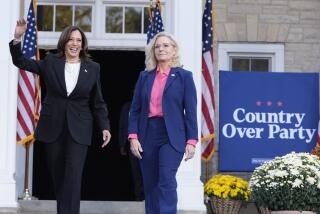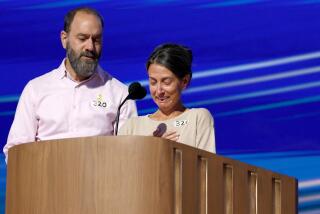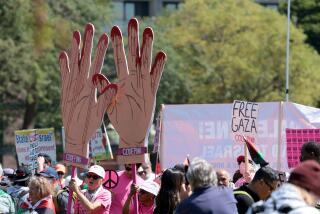Mother’s Protest at Bush’s Doorstep Raises the Stakes
- Share via
CRAWFORD, Texas — For more than a year, a modest bungalow known as “Peace House,” located a few miles from President Bush’s ranch, has served as a headquarters for antiwar activists. It is lonely work, with little more than a skeleton crew on hand much of the time.
But then Cindy Sheehan hit town.
For the record:
12:00 a.m. Aug. 13, 2005 For The Record
Los Angeles Times Saturday August 13, 2005 Home Edition Main News Part A Page 2 National Desk 1 inches; 45 words Type of Material: Correction
Cindy Sheehan -- An article in Thursday’s Section A about war protester Cindy Sheehan said conservative blogger Michelle Malkin had called activists supporting Sheehan “grief pimps.” Malkin’s blog carried the headline “The Grief Pimps,” but it referred to a posting from one of her readers.
The 48-year-old mother of Army Spc. Casey Sheehan, who was killed in an ambush in Baghdad last year, is consumed by the kind of grief that turns into a furious determination to do something -- in her case, to confront the president and force him to explain why her son died.
Now, in the space of just a few days, what started out as a seemingly quixotic personal mission has become something of a phenomenon -- with media swarming around Sheehan, leading liberal and antiwar activists parachuting in to try to make her their long-sought voice, and political experts in both parties working to assess what role she may have in galvanizing the public’s gathering unhappiness with the increasing American casualties in Iraq.
Antiwar leaders hope that putting the spotlight on Sheehan will motivate Americans who oppose the war, creating a political force strong enough to compel the Bush administration to change course.
MoveOn.org and other liberal groups have rushed to provide support, offering media expertise and attempting to assemble a corps of others who have lost relatives in Iraq or have family members serving there.
Liberal voices have swung into action on the Internet as well. On Wednesday, Democratic media consultant Joe Trippi organized a conference call with Sheehan for bloggers, aiming to garner more publicity. By Wednesday afternoon, “Cindy Sheehan” was the top-ranked search term on Technorati.com, the search engine for blog postings.
The White House, meanwhile, has sought to cope with Sheehan’s vigil without abandoning its strategy for dealing with the families of troops who have died. On a number of occasions, Bush has met with bereaved relatives -- including some who have challenged him sharply on the war -- but he has done so privately, away from news cameras and reporters.
Sheehan, a Vacaville, Calif., resident who opposed the war even before her son’s death, was a member of one such group in June 2004. She came away from that meeting dissatisfied and angry.
“We wanted [the president] to look at pictures of Casey, we wanted him to hear stories about Casey, and he wouldn’t. He changed the subject every time we tried,” Sheehan said. “He wouldn’t say Casey’s name, called him: ‘your loved one.’ ”
Sheehan, a co-founder of the antiwar group Gold Star Families for Peace, has said she would remain in Crawford until she got to see Bush face to face.
Until a cloudburst forced her to move to Peace House early Wednesday morning, Sheehan had been camping in a tent along a road about two miles from Bush’s Prairie Chapel Ranch. On Saturday, the day she arrived in Crawford, two senior White House aides -- national security advisor Stephen Hadley and deputy chief of staff Joe Hagin -- left the ranch to meet with her on a dusty road for 45 minutes.
That, she said, was not satisfactory.
By Wednesday night, Sheehan had given so many interviews that she was sucking on lozenges to soothe an inflamed throat. Her ears were sore from cradling a telephone. Her media advisor, newly arrived from San Francisco, said Sheehan had developed a fever.
None of that stopped her. Whether talking to newspaper reporters, People magazine or radio and television interviewers -- some from as far away as Japan -- she was relentlessly on message.
“I don’t believe his phony excuses for the war,” she said of Bush in an interview with a CBS reporter for the network’s Northern California affiliates. “I want him to tell me why my son died.
“If he gave the real answer, people in this country would be outraged -- if he told people it was to make his buddies rich, that it was about oil.”
Sheehan is certainly not the first to denounce the president over the war. From the beginning, activists have been outspoken in criticizing Bush’s policy and his stated reasons for sending U.S. troops into Iraq.
For the moment however, the personal nature of Sheehan’s protest -- with its edge of raw emotion -- and the concentration of news media staked out in Crawford, where Bush is spending much of August, have combined to raise her voice above the crowd.
“Anything that focuses media and public attention on Iraq war casualties day after day -- particularly [something] that is a good visual for television, like a weeping Gold Star mother -- is a really bad thing for President Bush and his administration,” said independent political analyst Charlie Cook.
“Americans get a little numb by the numbers of war casualties, but when faces, names and families are added, it has a much greater effect,” he said.
“Cindy Sheehan has tapped into a latent but fervent feeling among some in this country who would prefer that we not engage our troops in Iraq,” said Republican strategist Kellyanne Conway, president of the Polling Company, based in Washington.
“She can tap into what has been an astonishingly silent minority since the end of last year’s presidential contest. It will capture attention.”
But other analysts predicted that Sheehan would soon fade from the scene.
“The president has an Iraq problem, but I don’t think it’s much worsened by Mrs. Sheehan,” said professor Stephen Hess of George Washington University. “One Gold Star mother is a sympathetic figure, but collectively -- as Gold Star Families for Peace -- she is a movement and, as such, can be countered by a countermovement.
“I think the president might have defused the situation if he had invited her in instantly,” Hess said, predicting that GOP strategists would soon mount a counterattack.
Already, there were signs of just that.
Some have suggested that Sheehan is disloyal to criticize the president in time of war. Even in Vacaville, Sheehan said, some people say she is shaming her son’s memory. Conservative blogger Michelle Malkin disdainfully called the activists promoting Sheehan “grief pimps.”
The antiwar activists who have rushed to Sheehan’s side are all too well aware of the danger that her moment in the spotlight could become just another partisan shouting match.
Said Tom Matzzie of MoveOn.org: “Cindy reached out to us. We’re e-mailing our members about her story today, running a print ad in Waco [Texas]. Cindy is a morally pure voice on the war, so we’re trying to keep the focus on her and not jump in and turn it into a political fight.”
Since Sheehan arrived in Crawford, Peace House has been transformed into a beehive.
On the porch, bottles of water -- and a huge box of collapsible pink umbrellas -- were waiting Wednesday to be ferried out to “Camp Casey,” the muddy staging area along Prairie Chapel Road where Sheehan and about 100 of her supporters were gathered.
On a table in the living room were stacks of white T-shirts that read “BUSH ... Talk to Cindy! Moms and Vets Will Stop the War!”
In the tiny kitchen, two women busily chopped carrots and celery as they prepared to feed a growing cadre of activists. Other volunteers talked on their cellphones, coordinating with supporters around the country.
There was much speculation about “other moms” and parents of troops serving in the war coming to join Sheehan, although no one seemed to know for certain. “A busload is coming from Seattle,” one woman called out.
Stephanie Frizzell, 30, said she drove from Dallas with her son, Julian, 4, “to provide support for Cindy.” They met last weekend at a Dallas convention of veterans for peace.
According to Ann Wright, who identified herself as a former U.S. diplomat who resigned to protest the war, Sheehan seemed to make a spontaneous decision to come to Crawford while she was addressing the convention Friday.
Wright said many hands were raised, offering to join her mission.
As Sheehan put it Wednesday: “I just had the right idea in the right place at the right time.”
*
Times staff writers Ronald Brownstein, Joel Havemann and Johanna Neuman in Washington contributed to this report.
More to Read
Sign up for Essential California
The most important California stories and recommendations in your inbox every morning.
You may occasionally receive promotional content from the Los Angeles Times.












